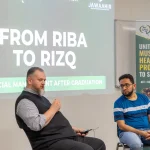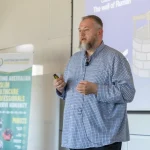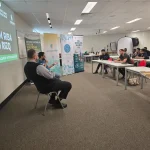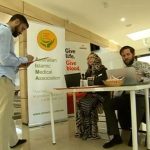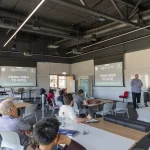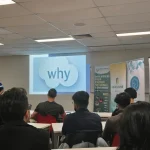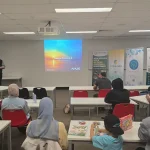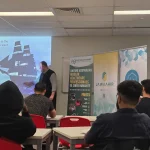By Mustafa Hamimi, Final Year Dentistry Student, AIMA QLD Secretary
Money is more than numbers in a bank account, it’s a trust, a tool, and a test. That message was at the heart of “From Riba to Rizq: Financial Management After Graduation,” a two-day program hosted by the Australian Islamic Medical Association QLD Chapter in collaboration with SoulSeed and Jawaahir, and supported by Griffith University Muslim Student Association (GUMSA), University of Queensland Muslim Student Association (UQMSA), Queensland University of Technology Muslims (QUT Muslims), University of Queensland Muslimah Association (UQ Muslimahs) and Bond University Muslim Student Association (BUMSA), that inspired Muslim healthcare students and young professionals to rethink how they manage wealth through an Islamic lens.
The program addressed a critical gap in healthcare education: financial awareness, a basic life skill that is not taught at university. Medical, dental, and allied health students often go from having very little money during their studies to suddenly receiving substantial incomes upon graduation, yet many lack the knowledge to effectively manage and plan for their financial future – particularly when seeking to do so through an Islamic lens that aligns with their faith and values.
Held across Griffith Gold Coast campus (Saturday 30 August 2025) and UQ St Lucia campus (Sunday 31 August 2025), the program attracted over 50 participants across both days, combining big-picture conversations with interactive workshops to help Muslim healthcare attendees make purposeful financial decisions after graduation.
The Saturday session at Griffith University Gold Coast Campus drew 30 attendees, while Sunday’s workshop at UQ St Lucia attracted 20 participants. The program featured two distinguished speakers who brought unique perspectives to Islamic finance and professional development.
Dr Salim Memon, Staff Specialist in General Medicine and Medical Director for Digital Transformation and Research, opened the discussions by sharing his journey of balancing patient care with shaping policy and redesigning healthcare systems. His candid presentation included real-life advice and personal reflections on his own financial mistakes and learning experiences, providing attendees with honest insights into the financial realities facing healthcare professionals. His reflections on purposeful living and community-centred success deeply resonated with attendees, demonstrating how professional excellence can be achieved while maintaining Islamic values and contributing to broader societal impact.
Almir Colan, Founder of Muslim Money Matters, guided participants through the principles of halal wealth, financial decision-making, and leading with faith in an increasingly complex economic environment. His expertise provided attendees with practical frameworks for navigating contemporary financial challenges while adhering to Islamic principles, covering essential topics including the distinction between riba and rizq, ethical investing approaches, and long-term wealth planning strategies that align with Islamic values.
The discussion extended beyond technical finance topics to address fundamental questions of legacy and values: How do we grow wealth without compromising on principles? How do we ensure money serves us, our families, and the wider community? The speakers explored key Islamic concepts including barakah (blessing), niyyah (intention), and amanah (trust), emphasizing wealth as a tool for building and supporting the ummah. Practical topics covered included lifestyle inflation awareness, exchange-traded funds (ETFs), Islamic stock screening, halal loan alternatives, superannuation considerations, and long-term legacy building. The session also addressed the importance of investing in personal development, experiences, and relationships while maintaining community connections and avoiding isolation.
Sunday’s workshop format was more interactive and Q&A-based, with discussions that challenged attendees’ current thinking and encouraged a mindset shift in terms of wealth through an Islamic perspective – how to approach it, plan with it, and consider the impact they can have on society. The smaller, collaborative environment fostered networking and peer learning, building on the foundational concepts from the previous day. Attendees also had the opportunity to have professional headshots taken, providing practical value beyond the educational sessions.
The impact of the program was best captured in the reflections of those who attended. One attendee shared: “The speakers were really thought-provoking. They made us reflect on what we actually want to do with the money we earn. We’ve studied hard and built our careers, but what’s the lasting outcome we want to achieve, and how do we get there?”
The program successfully emphasized that financial challenges are not merely technical but deeply spiritual, encouraging participants to view wealth management as an opportunity for personal growth and community contribution. As one participant reflected, the weekend was not just about how to earn money, but about how to use it wisely, ethically, and with purpose. The program’s success suggests strong appetite within the Muslim professional community for financial education that integrates Islamic values with practical career guidance, providing a foundation for similar initiatives across Australia’s Muslim communities.
The “From Riba to Rizq” program demonstrated the vital importance of addressing financial literacy within the context of Islamic principles for healthcare professionals. By bridging the gap between faith and finance, the initiative equipped participants with both practical skills and spiritual grounding to navigate their professional careers while remaining true to their values. The program’s success highlights the need for more initiatives that address the unique financial challenges facing Muslim professionals in Australia’s healthcare sector, ensuring future graduates can transition from their studies to their careers with both financial wisdom and spiritual clarity.

